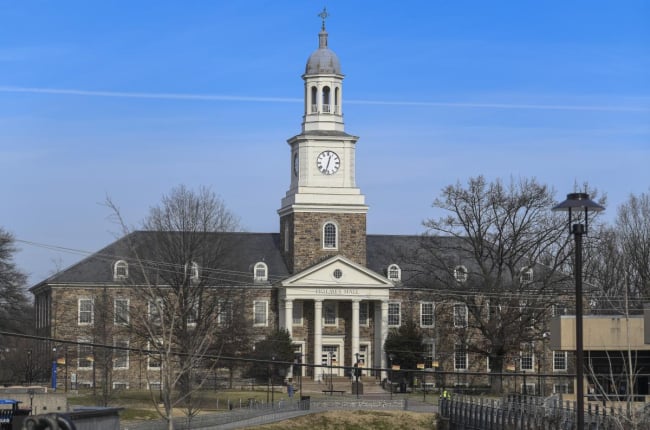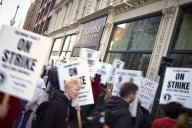You have /5 articles left.
Sign up for a free account or log in.

Morgan State University
The Washington Post/Contributor/Getty Images
Historically Black colleges and universities across the country continue to receive bomb threats as part of what federal law enforcement agencies characterized as a connected series of hate crimes.
The threats, the latest of which occurred Tuesday, have been made on three separate occasions—on Jan. 4, Jan. 31 and Feb. 1—and have prompted affected colleges to either lock down or evacuate their campuses, direct students to shelter in their dorms or elsewhere, and move classes online. A few colleges even went so far as to relocate students to hotels. The frequency and expanse of the threats, coming at a time when campuses have already been disrupted by the pandemic and the continued reverberations of the racial justice protests of 2020, as well as the recent high-profile court trials of police and civilians charged with murdering unarmed Black men, have left students and the leaders of these colleges reeling.
David Wilson, president of Morgan State University in Maryland, is concerned about the mental health and emotional well-being of his students after Morgan State was among the more than a dozen HBCUs that received bomb threats Tuesday.
Administrators shut down the Baltimore campus Tuesday morning and issued a shelter-in-place order, moving classes online for the remainder of the day. No suspicious items were found, and an all-clear message went out, “following a thorough and exhaustive sweep of the campus and its buildings, including all residential facilities on and off site,” a tweet from the university said.
But Wilson said the bomb threat marks yet another trauma his students have had to experience in their lifetimes, on top of the killings of Trayvon Martin, George Floyd and many other unarmed Black citizens “who look like them” by law enforcement and white vigilantes, as well as a pandemic that disproportionately affected communities of color.
“My initial concern was the fact that my students were getting the message, once again, that this society hates them because of the color of their skin,” he said.
Though no explosives were found on the campuses this week and all-clear notices were issued, much like after a similar spate of threats in early January, the threats rattled students, parents, faculty and staff members, and prompted a groundswell of support from local, state and federal policy makers.
Members of the House of Representatives Education and Labor Committee and the Senate Committee on Health, Education, Labor and Pensions issued a statement Wednesday condemning the threats and calling for a briefing on the investigation of the recurring bomb threats by Department of Justice representatives.
“Such acts of intimidation, which threaten both the safety and education of students enrolled at HBCUs, are of grave concern and we must work to protect these remarkable institutions and their students,” the statement said.
Federal law enforcement officials believe the threats are racially motivated.
A statement from the Federal Bureau of Investigation said more than 20 FBI field offices across the country are involved in an investigation of the bomb threats.
“These threats are being investigated as Racially or Ethnically Motivated Violent Extremism and hate crimes,” the statement read. “Although at this time no explosive devices have been found at any of the locations, the FBI takes all threats with the utmost seriousness and we are committed to thoroughly and aggressively investigating these threats.”
FBI officials also held a conference call Wednesday afternoon with HBCU and other higher education leaders in which they confirmed that a handful of people are suspected of being involved in the threats, an anonymous source on the call told Inside Higher Ed. According to the source, FBI officials said one of the threats referenced taking “revenge” for Dylann Roof, who committed a racially motivated mass murder at a church in Charleston, S.C., in 2015.
The threats on Tuesday—which many people noted was the first day of Black History Month—were received at Xavier University of Louisiana, Spelman College, Edward Waters University, Kentucky State University, Rust College, Coppin State University, Alcorn State University, Mississippi Valley State University, Jackson State University, Philander Smith College, the University of the District of Columbia, Morgan State University, Fort Valley State University and other institutions. At least six HBCUs received threats the day before, and at least nine institutions faced similar threats on Jan. 4.
“As we begin this Black History Month, we do so in the context of a fresh reminder of the racist terror against which so many whose contributions and achievements we celebrate had to struggle,” the American Association of Colleges and Universities said in a statement, which noted that “the specific targeting of HBCUs comes amid a sharp and ongoing increase in racially motivated hate crimes across the United States.
“While the bomb threats have so far not proven credible, they nonetheless disrupt campus life; spread fear and anxiety among students, faculty, and staff; and strain campus and community resources. The American Association of Colleges and Universities condemns in the strongest possible terms these attempts to terrorize our students, and we support our HBCU colleagues.”
Mary Schmidt Campbell, president of Spelman College, echoed similar sentiments about the motivation behind the bomb threats.
“These threats are despicable,” she said in a statement released after the Atlanta Police Department and the Georgia Bureau of Investigation searched the campus Tuesday. “They are designed to make us feel fearful and vulnerable.”
NBC News reported Wednesday that an unnamed law enforcement official told the outlet that six persons of interest have been identified in the FBI investigation, all of them juveniles. The young people suspected appear to have been “tech-savvy” in their attempts to disguise the source of the threats, the official said, according to NBC.
Wilson, the president of Morgan State, said federal, state and local officials have been “very responsive” to the crisis.
“We are hopeful that this investigation will lead to the identification of the individual responsible for these major disruptions at our institutions and that individual will be brought to justice,” he said.
Wilson added that “one would have to close their eyes to reality” to believe the threats were not racially motivated, given the sheer number of threats targeting institutions that predominantly serve Black students.
Greg Carr, an associate professor of African American studies at Howard University and an adjunct professor at the university’s law school, said the threats likely reflect “an increase in racial animus that is certainly driven by the wild rhetoric of white nationalism that has been normalized over the last four or five years.”
He said these attitudes aren’t new and are apparent “when we look at the long arc of racially motivated violence against Black folk in the United States in general and against Black educational institutions in particular.” There are examples from as long ago as the early 19th century of low-income white Americans perceiving “the idea of Black self-improvement” as a “threat” and responding with violence, damaging abolitionist schools or attacking Black students because they embrace “this idea that education for Blacks somehow diminished their status in society.”
Carr added that there’s been an attitude in American society since the mid-1960s that “these people who have been oppressed have gotten enough now.” He said such beliefs are reflected in pushback against policies like affirmative action and debates about teaching critical race theory. He believes bomb threats are part of the same continuum and reflect a “cultural anxiety, a political anxiety” among poorer white Americans about their own socioeconomic status that leads them to “scapegoat” Black people.
Delaware State University president Tony Allen called the threat to his campus “a clear effort to confuse, intimidate, and bully our students, staff, and faculty.”
“The impetus for such a threat cannot be ascribed to anything other than the most primitive form of racism, a form which is neither new nor unique in this country,” he wrote in a statement. “Here is what I say to these bullies, these fear-mongers of our day: ‘We shall not be moved.’”
Harry Williams, president and CEO of the Thurgood Marshall College Fund, which represents public HBCUs, said the threats were “unfortunate distractions” for the institutions.
“Every student, staff and faculty member deserve a safe place to learn, live and work,” Williams said in a statement. HBCUs “continue to be recognized for supplying leaders to the nation for nearly 200 years, from Supreme Court Justice Thurgood Marshall to Vice President Kamala Harris.”
Tymek Jones, a senior and student leader charged with promoting student well-being in residence halls at Howard University, said students have been fearful and anxious ever since the first threats were made. Howard students received alerts about threats on both Monday and Tuesday, as well as in early January.
“The thought of having your university bombed, it’s scary,” he said. “It’s disheartening, especially knowing the history that lies within bombing Black communities and Black spaces … One of the greatest fears is the fear of unknowns, and right now, this threat has kind of forced us to face the reality, the fear of what may happen, the fear of that actually happening.”
Carr said it’s important not to underestimate the emotional “toll of this perpetual violence” and the repeated fears and concerns raised by bomb threats and other forms of racism on students.
“They should just be going to school, trying to improve themselves and their communities,” he said. “They shouldn’t have to carry that burden.”









